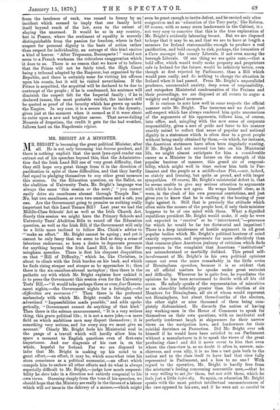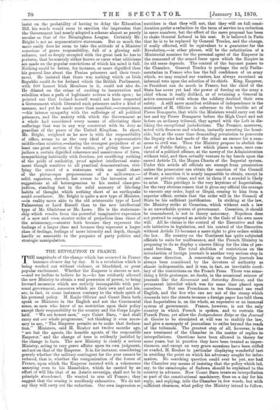MR. BRIGHT AS A MINISTER.
Lit all. He is not only becoming but become prudent, and there is nothing explicit that the most lynx-eyed reader can 'extract out of his speeches beyond this, that the Administra- tion find the Irish Land Bill one of very great difficulty, that they still hope very great things from it in the direction of pacification in spite of these difficulties, and that they hardly deel equal to pledging themselves to any other great measure -this session. On the Education question, on the Ballot, on the abolition of University Tests, Mr. Bright's language was always the same this session or the next ;' " you cannot easily drive six omnibuses abreast through Temple Bar." !No, but two omnibuses, or even two omnibuses and a cab, you can. Are the Government going to promise us nothing really important but this Land Tenure Bill ? Last year we had the .Middle-Class Schools' Act as well as the Irish Church Act. Surely this session we might have the Primary Schools and University Tests' Abolition Bills to round off the Education 'question, as well as the Irish Bill, if the Government will only be a little more inclined to follow Mrs. Chick's advice to -" make an effort." Mr. Bright cannot be ageing ; and yet it 'cannot be only fancy that we seem to find so deep a sense of laborious endeavour, so keen a desire to deprecate pressure for anything beyond the Irish Land Bill, in his four Bir- mingham speeches. There is first his eloquent disquisition on that " Hill of Difficulty," which he, like Christian, is -about to climb with the Irish burden on his back, and which he finds rising steeper and steeper as he approaches it ; then -there is the six-omnibus-abreast metaphor ; then there is the pathetic cry with which Mr. Bright explains how unkind it is to press the Government this session even for the University Tests' Bill,—" it would take perhaps three or even four Govern- ment nights,—the Government nights for a fortnight,—the .cliniculties are enormous ! " Then there is the profound melancholy with which Mr. Bright recalls the man who .advertised " Impossibilities made possible," and adds apolo- getically, " Government cannot do anything of that kind." Then there is the solemn announcement, " It is a very serious thing, this grave political life ; it is not a mere joke,—a mere field on which ambitious men may disport themselves ; it is something very serious, and for every step we must give an account." Clearly Mr. Bright feels his Ministerial soul in the pangs of a travail which will hardly allow him to -spare a moment to English questions even of first-rate importance. And our diagnosis of his case is, on the whole, hopeful for Ireland. For we are disposed to infer that Mr. Bright is making up his mind to a -great effort,—an effort, it may be, which somewhat tries his stern conscience as a political economist,—an effort which compels him to eschew all other efforts and do what is always especially difficult to Mr. Bright,—judge how much responsi- bility he dare take in a direction not entirely congenial to his town views. Guessing simply from the tone of his speeches, we should hope that the Ministry are really in the throes of a labour 'which will not issue in the delivery of a mouse,—which might
even be great enough to invite defeat, and be carried only after resignation and an education of the Tory party,' like Reform. Of course, with so many stern landowners in the Cabinet, Hit not very easy to conceive that this is the true explanation of Mr. Bright's evidently labouring breast. But we are disposed to hope that it may be so, and that we are to have at length a measure for Ireland statesmanlike enough to produce a real pacification, and bold enough to risk, perhaps, the formation of a Cave amongst the county Liberals, if not even among the borough Liberals. Of one thing we are quite sure,—that a bold offer, which would really make property and proprietors safe in Ireland for the future, would be infinitely better, even though at first rejected by Parliament, than a Bill which would pass easily, and do nothing to change the situation in Ireland when it had passed. From Mr. Bright's unparalleled prudence, unconcealed anxiety, deep sense of responsibility, and outspoken Ministerial condemnation of the Fenians and their proceedings, we are disposed at all events to augur a weighty and original measure.
It is curious to note how well in some respects the official manner suits Mr. Bright. The immense and no doubt just self-respect which has always rendered him quite unconscious of the arguments of his opponents, follows him, of course, into office, and, mingling with the new sense of corporate responsibility, gives a sort of pride and force to his manner exactly suited to reflect that sense of popular and national dignity in a statesman which is often dear to a great people without being easily obtained by them,—in which, for instance, the American statesmen have often been singularly wanting. If Mr. Bright had not entered too late on his Ministerial life, we might almost anticipate for him a considerable career as a Minister in the future on the strength of this popular hauteur of manner, this grand air of responsi- bility, which might well in time endear him both to Par- liament and the people as a middle-class Pitt,—not, indeed, so stately and freezing, but quite as proud, and with larger sympathies. Of course, Mr. Bright's ministerial defect is, that he seems unable to give any serious attention to arguments with which he does not agree. He wraps himself close, as it were, in the cloak of his own personal convictions, and just gives you to know that he is smiling at the beating of your logic against it. Still that is precisely the attitude which often suits the masses of the people best, if only their minister happens to be of one mind with them. What a dignified republican president Mr. Bright would make, if only he were not expected to "receive" or be "interviewed,"—processes for which he would be far too dictatorial and impatient ! There is a deep intolerance of hostile argument in all great popular bodies which Mr. Bright's political hauteur of mind exactly represents, and represents far more effectively than that common-place American jealousy of criticism which finds expression in the complaint that American " institutions" are misunderstood or morbidly disliked. This proud self- involvement of Mr. Bright's in his own political opinions comes out even the more remarkably in the little series of Birmingham speeches, because it is so evident that on all official matters he speaks under great restraint and difficulty. Wherever he is quite free, he repudiates the opinions he has been accustomed to deride with all his old scorn. He calmly speaks of the representation of minorities as an absurdity infinitely greater than the election of six Members for Birmingham, all six of whom would represent not Birmingham, but about three-fourths of the electors, the other eight or nine thousand of them being com- pletely disfranchised. He discards the notion of having any working-men in the House of Commons to speak for themselves on their own questions, with an incidental and perfectly irrelevant laugh at shipowners for their narrow views on the navigation laws, and landowners for their suicidal doctrines on Protection. Did Mr. Bright ever ask himself if he would have been satisfied to see Parliament
without a manufacturer in it to speak the views of the great
producing class ? and did it never occur to him that even where the class-view is, as no doubt it often is, narrow, mis- chievous, and even silly, it is no less a vast gain both to the nation and to the class itself to have had that view fully represented in Parliament, and a loss to no one I With regard to the operative, Mr. Bright is hardly free from
the aristocrat's feeling concerning mercantile men,—that he is very willing to act for them, but not with them, which he feels just a little infra dig. So again, on education Mr. Bright speaks with the most perfect intellectual unconsciousness of the case opposed to his own, and if he were not so careful to
insist on the probability of having to delay the Education Bill, his words would seem to sanction the impression that the Government had nearly adopted a scheme almost as purely secular as that of the Birmingham League. Certainly Mr. Bright is not an argumentative statesman. But so much the more easily does he seem to take the attitude of a Minister conscious of grave responsibility, full of a glowing self- reliance, and so deeply occupied with the great task he has to perform, that he scarcely either knows or cares what criticisms are made on the popular convictions of which his mind is full. Nothing could be better, for instance, or more dignified than his general line about the Fenian prisoners and their treat- ment. He insisted that there was nothing which an Irish Republic could do for Ireland which the British Parliament, with 100 honest Irish Members in it, could not also do. He dilated on the crime of exciting to insurrection and rebellion when a path of legitimate redress is wide open ; he pointed out that Ireland herself would not have respected a Government which liberated such prisoners under a kind of menace, and yet he made more than manifest,—conspicuous, —his intense sympathy with the sufferings of all political prisoners, and the anxiety with which the Government as a whole had considered every means of alleviating their sufferings that was in any way consistent with its duty as guardian of the peace of the United Kingdom. In short, Mr. Bright, weighted as he now is with the responsibility of office, seems to us the very ideal of a representative middle-class minister,—sharing the strongest prejudices of at least one great section of the nation, yet giving those pre- judices a certain dignified coherence and massiveness of form, sympathizing habitually with freedom. yet sacrificing nothing of the pride of authority, proof against intellectual state- ment though sensitive to all practical demonstrations, vivi- fying the creed of a statesman with no small share of the picturesque prepossessions of a mill-owner,- solid, sagacious, shrewd, but averse to the intrusion of all suggestions at all heterogeneous to his rooted class-pre- judices, standing fast in the solid masonry of life-long habits of thought which nothing short of an earthquake could overthrow. Mr. Bright is quite a new type of Minister, —in reality more akin to the old aristocratic type of Lord Palmerston or Lord Russell than to the new intellectual type of Mr. Gladstone or Mr. Lowe. His is the statesman- ship which results from the powerful imaginative expression of a new and even stouter order of prejudices than those of the aristocracy,—stouter both because they represent the feelings of a larger class and because they represent a larger class of feelings, feelings of more intensity and depth, though hardly so amenable to the purposes of party politics and strategic'manipulation.































 Previous page
Previous page